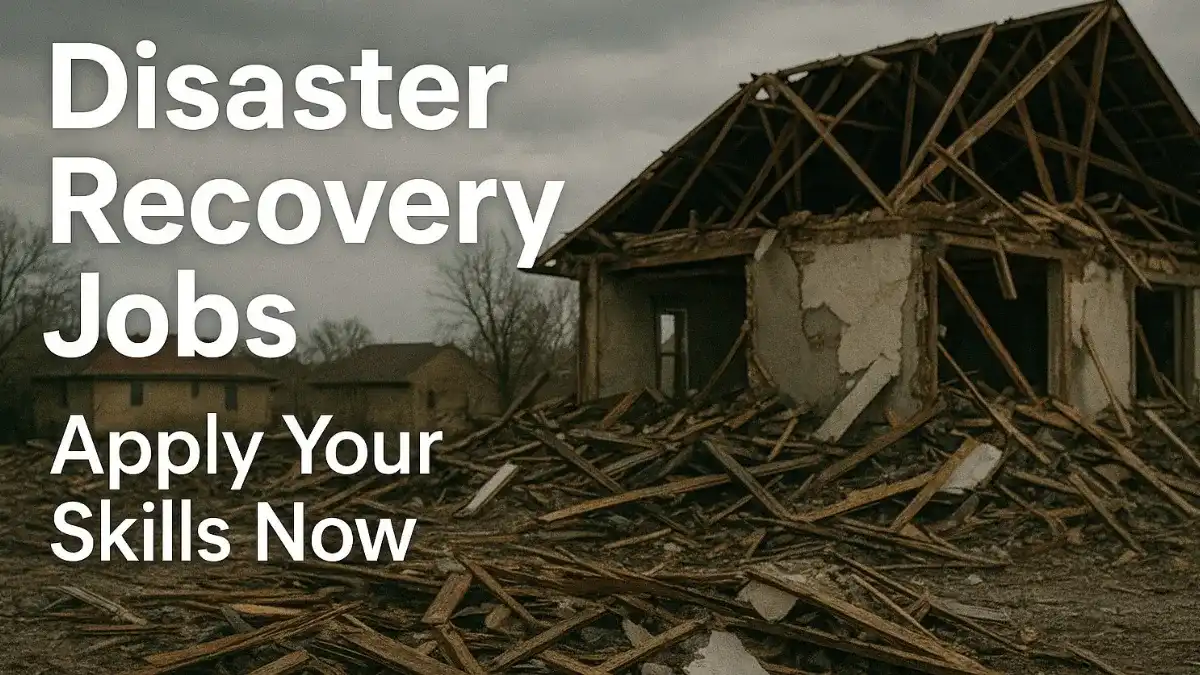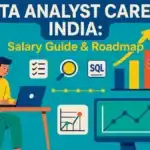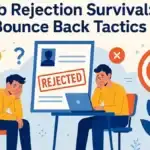Disaster Recovery Jobs, So you’re scrolling through your phone this morning, coffee in hand, when the news flashes: another earthquake hits Delhi. Your first thought? “I hope everyone’s safe.” But then, if you’re career-minded like most of us hustling in Mumbai, Pune, or Bangalore, a sneaky second thought creeps in: “Could this shakeup actually create opportunities for people like me?”
Here’s the real talk: Natural disasters like earthquakes aren’t just headlines – they’re tragic events that also reshape job markets overnight. While the dust settles, a silent hiring boom begins. Think about it: collapsed buildings in Ghaziabad need reconstruction teams, disrupted supply chains in Noida require logistics experts, and traumatized communities in Faridabad need mental health support. But how do you pivot from watching the news to seizing these unexpected career openings? Let’s cut through the noise.
Why Disaster Response Isn’t Just for Heroes (It’s for Techies, Managers & You)
Remember the Chennai floods? Or the Uttarakhand landslides? After the initial rescue ops, here’s who got busy:
- The Rebuilders: Construction firms in Pune raced to hire project managers and civil engineers who understood seismic-resistant designs.
- The Tech Fixers: Bangalore-based startups launched apps for emergency supply tracking – needing coders and UX designers overnight.
- The Invisible Backbone: Hospitals in Mumbai added counselors; logistics giants hired warehouse supervisors for aid distribution.
These aren’t temporary gigs. A 2022 NDMA report showed disaster management hiring spiked by 38% post-major events. Companies like Digital Smart Careers even track these hidden job surges, connecting professionals with roles in crisis analytics or infrastructure auditing. The key? Seeing beyond the rubble.
Your Skills Are Already Needed (Seriously, Check This Table)
Don’t assume you need a hard hat or a medical degree. Disaster recovery needs your existing skills – just applied differently:
| Your Current Role | Disaster Recovery Application | Who Hires? |
|---|---|---|
| IT Support / Developer | Restoring communication networks, building damage assessment apps | Tech NGOs (e.g., SEEDS), Govt. portals, Telecom firms |
| Sales / Marketing | Coordinating donor campaigns, managing community outreach | UN agencies, Red Cross, Local NGOs |
| HR / Admin | Managing volunteer teams, crisis payroll, temporary staffing | Relief organizations, Corporate CSR wings |
| Civil Engineer / Architect | Safe demolition, rapid infrastructure assessment | L&T, Tata Projects, NDMA partners |
Take Priya, a Mumbai data analyst. After the 2021 floods, she used her Excel mastery to track shelter occupancy for an NGO – which landed her a full-time role with a disaster tech startup. No “rescue training” needed. Just adaptability.
How to Position Yourself Before the Next Crisis (Yes, Now)
Waiting for disaster to strike is a terrible career strategy. Here’s your proactive playbook:
- Follow the Money (and Policy): Track organizations like the National Disaster Management Authority (NDMA). Their tenders = upcoming contracts = jobs. Set Google Alerts for “disaster resilience funding [Your City]”.
- Micro-Credentials That Matter: A weekend online course in GIS mapping (Coursera) or Project Management for Humanitarians (DisasterReady.org) makes your resume stand out.
- Volunteer Strategically: Don’t just distribute rice packets. Offer your core skill – e.g., manage social media for a local NGO’s flood response. This builds relevant experience.
Platforms like Digital Smart Careers offer free webinars on “transferable skills in high-risk regions” – gold for making your existing expertise disaster-ready.
Real People, Real Pivots: From Bystander to Hired
Rahul’s Story (Bangalore): This IT project manager felt stuck until Cyclone Tauktae hit. He volunteered with a non-profit coordinating supply chains using software he knew (Zoho Inventory). Six months later, he’s leading a team at a firm specializing in disaster logistics tech. His win? He solved a problem with tools he already had.
Ananya’s Shift (Delhi NCR): An HR professional, she started attending NDMA community workshops. When earthquakes disrupted local businesses, she pitched “rapid re-employment drives” to consulting firms. Today, she runs crisis workforce programs for corporates. Her secret? Networking before the emergency.
Your 72-Hour Career Response Plan (Start Today)
Disasters move fast. Your prep shouldn’t. Execute this now:
- Update Your LinkedIn: Add keywords: “disaster resilience,” “crisis coordination,” “rapid deployment.” Recruiters search these during events.
- Identify 3 Local Players: Research NGOs, govt bodies, or firms (like RebuildIndia Trust in Pune) active in recovery. Follow them. Comment intelligently on their posts.
- Take One Action: Enroll in a free FEMA/NIDM online module today. Even 2 hours shows initiative.
Resources like Digital Smart Careers offer checklists like “Disaster-Proof Your Resume” – practical, not preachy.
Wrapping It Up: Build Purpose, Not Just a Paycheck
Watching the Delhi earthquake news doesn’t have to leave you feeling helpless. Those collapsed buildings in Gurgaon? They’ll need engineers. The disrupted supply chains in Noida? They’ll need planners. The communities in Meerut? They’ll need counselors and communicators. This isn’t about profiting from pain – it’s about channeling your skills where they’re desperately needed. And guess what? That’s where meaningful careers thrive.
Remember Priya and Rahul? They didn’t wait for permission or a perfect job title. They saw chaos and thought, “Where do I fit in?” That’s your power move. Keep your core skills sharp, stay alert to needs unfolding around you, and position yourself as the solution. When the ground shakes, be the one who builds.
Your Disaster Recovery Career Toolkit
FAQs:
- Q: Do I need a degree in disaster management?
A: Rarely! Most roles prioritize adaptable skills (IT, logistics, comms). Short certifications add credibility. - Q: Are these jobs only short-term contracts?
A: Initial response roles might be, but reconstruction, policy, and prevention jobs last years. Example: NDMA’s urban resilience projects. - Q: How do I find these opportunities fast?
A: Monitor LinkedIn, ReliefWeb.int, and state disaster authority portals. Set “job alerts” for keywords like “rapid response.” - Q: Is volunteering really worth it for career growth?
A: Strategic volunteering = real experience + network. List it under “Projects” on your resume with measurable outcomes.
Must-Have Apps & Tools:
- Sahana EDEN: Open-source disaster management platform (great for understanding tech needs).
- NDMA India App: Real-time alerts + volunteer registration. Shows you’re serious.
- ReliefWeb: Global disaster updates + job board for NGOs/UN agencies.
5 Quick Wins to Start Today:
- Follow Digital Smart Careers on LinkedIn for sector-specific tips.
- Take ONE free module on Coursera: “Planning for Climate Change in African Cities” (skills transfer globally).
- Rewrite your LinkedIn headline: “Project Manager | Specializing in Rapid Deployment Solutions.”
- Email a local NGO: “Can I use my [your skill] to support your disaster prep work?”
- Bookmark nidm.gov.in/careers – NDMA’s official job portal.






